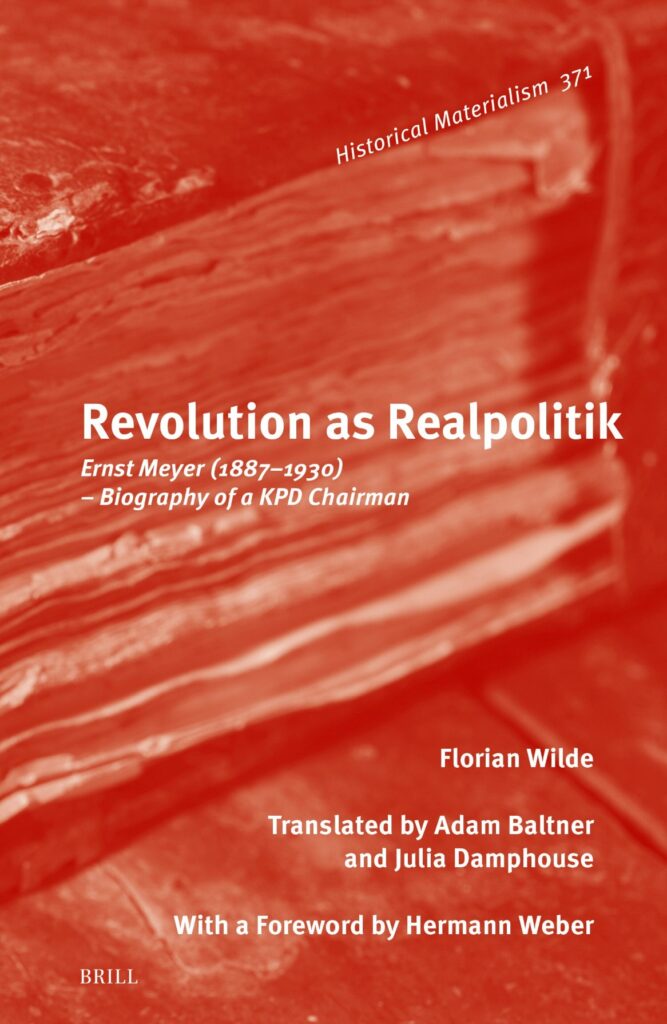Florian Wilde
Despite this, Meyer has largely been forgotten. Florian Wilde now traces for the first time the political and private life and work of this disciple of Rosa Luxemburg, highlighting the strategic debates within the KPD and the alternatives to its Stalinisation, inherent in the development of the party.
Biographical Note
Florian Wilde, Ph.D. (2013), is a historian and Research Fellow for Trade Union Politics at the Rosa-Luxemburg-Stiftung. He is co-editor of Politische Streiks im Europa der Krise (2012) and editor of the German editions of books by U.S. trade union organizer Jane McAlevey (2019, 2021, 2023).
Readership
This book is especially relevant to post-graduate students, research libraries, scholars of Weimar Germany, the history of communism in Germany, the history of German fascism and the united front strategy.
Table of Contents
Foreword
Preface
List of Figures
Translators’ Note
1 Introduction
2 Radicalisation in the Pre-War SPD (1908–14)
1 Childhood, Youth, Student Days and Joining the SPD
2 The SPD in the Pre-War Years and the Emergence of the Radical Left Wing
3 In Steglitz with the Radicals
4 The Pub as Nucleus
5 Editor at Vorwärts
6 Convicted of Lèse-majesté
3 With Spartacus Against the War (1914–18)
1 4 August 1914: Horror, Despair and Resistance
2 The International Group between Cooperation and Demarcation
3 The International against the War: At the Zimmerwald Conference in 1915
4 The Founding of the Spartacus Group
5 The International against the War, Part II: The Kienthal Conference of 1916
6 Termination from Vorwärts and the Dues Boycott Campaign
7 In Prison
8 The Founding of the USPD
9 Preliminary Retreat from the Spartacus Leadership in 1917
10 The October Revolution and Debates on Bolshevik Politics
11 On the Path towards Revolution: Leader of the Spartacus Group in 1918
12 Important Actor of the November Revolution
4 In the KPD Leadership (1919–20)
1 At the Founding Party Congress
2 The Ill-Fated Uprising
3 Murdered Friends and a Decapitated Party Leadership
4 Nine Months in Preventative Detention
5 The Heidelberg Party Congress and the KPD Split
6 Resisting the Kapp Putsch
5 Exponent of the Left Wing (1920–1)
1 ‘Revolutionary Offensive’ over ‘Anti-Putschist Cretinism’
2 At the Second World Congress of the Comintern
3 Finally a Mass Party: Unification with the USPD
4 Editor-in-Chief of the Rote Fahne des Ostens
5 Chairman of the KPD Group in the Prussian Landtag (1921–4)
6 Back to the Zentrale and into the Uprising: The March Action of 1921
7 Party Crisis and a Departure from the Theory of the Offensive
8 The Turn towards the United Front Policy
6 Party Chairman and Protagonist of the United Front (1921–2)
1 Parting Ways with the Left Wing: At the Jena Party Congress
2 Driven by Work: The Tasks of a Party Chairman
3 Divorce and New Love
4 The United Front as Revolutionary Realpolitik
5 The Necessity of Inner-Party Democracy
6 On Equal Footing with Moscow? Meyer, the KPD and the Comintern
7 Successful Consolidation of the Party
8 Meyer’s Ousting
7 Hoping for Revolution, Experiencing Defeat (1923)
1 ‘For Once, Out of the German Party Row’: For the KPD in France
2 Director of the Super-District Southwest
3 Meyer in ‘German October’
4 After the Retreat: The Crisis of the Party
8 At the Centre of the Opposition to the Ultra-Left Course (1924–5)
1 Ernst, Rosa and their Children
2 The Left-Wing Takeover of the Party
3 ‘Insane Party Debates, Nasty Personal Differences’: Opponents of the Fischer–Maslow Leadership
4 Total Isolation: At the Tenth Party Congress of the KPD
9 The Struggle for a Return to the United Front (1925–6)
1 ‘Struck Like an Unexpected Bomb’: The Comintern’s Intervention
2 In Factional Struggles
3 On the Upswing
4 The United Front during the Referendum on the Expropriation of the Princes
5 ‘If Mohammed Won’t Come to the Mountain’: The Rocky Road to a Consolidated Leadership
6 ‘A Drama that Broke Ernst’s Spirit’: Meyer’s Moscow Declaration
7 The Splitting of the Meyer Group
8 ‘I Almost Regret My Diligence’: Between Self-Doubt and Integrity
10 Leading the Party with Thälmann
1 ‘Not an Acutely Revolutionary Situation’: Meyer’s Assessment of the Political Climate
2 The Essen Congress: Meyer Returns to the Helm
3 Struggling for the United Front: Heated Debate over the SPD’s Left Wing
4 Debates on Inner-Party Democracy and a Programme of Action
5 Struggle against the Threat of War, ‘Ten Years of the Soviet Union’ Campaign, and Historiographical Disputes
6 Taking Stock of Meyer’s Work in the Party Leadership in 1927
7 To the Sanitorium with Illness and Burnout
11 Meyer’s Final Stand: Fighting Stalinism with His Last Ounce of Strength (1928–30)
1 Stalin and the Comintern’s Ultra-Left Turn
2 Between the Fronts in December 1928
3 Back to the Wall against Stalinisation
4 Meyer’s Final Struggle
5 Illness, Death, Funeral
6 The Fate of those Left Behind: Resistance and Exile
12 Epilogue
Bibliography
Index

